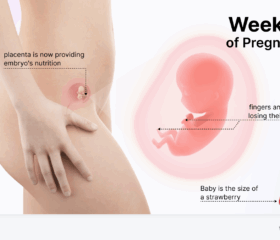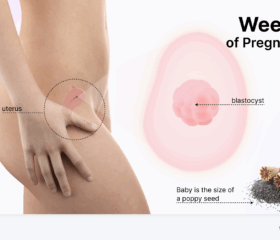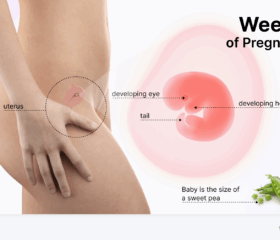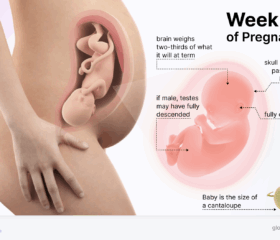Pregnancy Week by Week
1-2 Weeks Pregnant
Your baby hasn't been conceived yet.

- Navigating Weeks 1 and 2 of Pregnancy: A Comprehensive Guide
- What happens in the first two weeks of pregnancy?
- How your body changes during the first two weeks of pregnancy
- How your body changes after week 1 and 2
- How to get ready for pregnancy
- When to see your doctor about your fertility
- Final thoughts
What happens in the first two weeks of pregnancy?
Technically, not a whole lot is going on for the first week or two—because, again, you haven’t actually conceived, and aren’t pregnant quite yet.
Weeks 1 and 2 are pre-conception because of how doctors calculate due dates. They count 280 days (40 weeks) from the first day of your last menstrual period (LMP). 1
Doctors and due date calculators (including those in pregnancy trackers) use this because it’s difficult to pinpoint the exact moment you got pregnant. However, the actual moment of conception (sperm meeting the egg) generally happens around 14 days after the start of your last period, about midway through your cycle (assuming you have a regular 28-day cycle). 2
Put another way, you’re actually on your period during the first week of pregnancy. In the second, you’re just about getting ready to ovulate (release an egg for fertilization), but it hasn’t happened yet. 3
When will you actually get pregnant?
With those two extra weeks at the start, the timeline can get a bit murky. Here’s a breakdown of what happens during the first 4 weeks of pregnancy: 3
- Week 1: Your body sheds the uterine lining from your previous cycle. This is your menstrual period.
- Week 2: While your body prepares for ovulation, an egg matures in your ovary. After it develops, it moves down to one of your fallopian tubes and waits to get fertilized.
- Week 3: If you have sex in your fertile window, a sperm cell may reach the egg and penetrate it. That’s arguably when you officially become pregnant. About six days later, the fertilized egg (now called a zygote) travels from your fallopian tube to your uterus.
- Week 4: Once it’s in your uterus, the zygote implants into your uterine lining. This may occur later in week 3 or early in week 4.
Week 4 or 5 is when you may realize that you’ve missed your period. This is also the earliest you can take a pregnancy test and expect a positive result (before that point, even if you’ve conceived, the pregnancy test might be negative).
If you’re pregnant, you should book an appointment with your doctor. They’ll conduct a physical exam, discuss your medical history and any concerns you have, and run blood and urine tests to confirm that you’re pregnant and possibly do an ultrasound to determine how far along you really are. 4

How your body changes during the first two weeks of pregnancy
Since you haven’t conceived (yet), in weeks 1 and 2, your body will go through your usual menstrual cycle. Here’s what you can expect:
Week 1 symptoms
Again, you’re still on your period, so these symptoms are from your menstrual cycle, not pregnancy. Expect them to be business as usual—bleeding, fatigue, cramping, bloating, mood swings, headaches, etc. Whatever your periods are normally like, that’s probably what you’ll get.
Week 2 symptoms
When you move into week 2, your period ends. You may experience postmenstrual symptoms like headaches and anxiety, although that isn’t universal. 5
In week 2, your body starts preparing for ovulation. You may notice other changes:
- Cervical mucus: One to two days before you ovulate, your cervical mucus becomes clear, slippery, and stretchy, with many women referring to it as egg white discharge. You’re very fertile now, and sperm can swim through your cervix more easily. 6
- Cervical positioning: Your cervix moves further back and “higher” in your body, making it hard to reach if you check with your fingers. It also softens and thins. 7 8
- Ovulation pain: Some women experience a dull ache or sharp twinge around ovulation, known as mittelschmerz. It can last anywhere from a few minutes to one or two days. Usually, it affects one side of your lower abdomen at a time, depending on which of your ovaries releases an egg. 9 Just be aware that there’s no link between ovulation pain and successfully getting pregnant.
You might also notice other ovulation symptoms and signs, like a higher sex drive, bloating, tender breasts, and heightened senses (smelling, tasting, and hearing things more acutely). 10
Some people also believe that there are changes to their basal body temperatures (BBT) that happen around ovulation. This is your body’s resting temperature, and it supposedly has a small dip just before ovulation and then a slight (about 0.4 °F to 1 °F) rise after ovulation. 11
Tracking it is a popular fertility-prediction method, but you’ll need to track with a special basal thermometer (with two decimal points) for about three months before you can hope to see a real pattern. 12
How your body changes after week 1 and 2
If you do manage to get pregnant, you may experience early pregnancy symptoms in the first few days and weeks, some of which overlap with ordinary PMS symptoms. This makes it hard to distinguish between PMS and pregnancy. 13 14
- Missed period
- Nausea
- Fatigue
- Swollen or tender breasts
You may also have light spotting called implantation bleeding, which happens when the fertilized egg implants in your uterus’s wall. This happens 10 to 14 days after ovulation, which is right around—or slightly before—the time your period is typically due to return. Only 25% of women experience this early sign of pregnancy. 15
How to tell the difference between implantation bleeding and your period
As mentioned, implantation bleeding can come when you expect your next period, which can be confusing.
However, implantation bleeding is normally lighter than your period. It’s normally brownish or pinkish instead of red, like menstrual blood, and shouldn’t last more than two days. Accompanying cramping, if there is any, tends to be milder as well.
How to get ready for pregnancy
Even though you’re not pregnant yet, weeks 1 and 2 are still an important time to lay the groundwork for a healthy pregnancy. If you’re trying to get pregnant, here’s what you should focus on:
1. Visiting your doctor
Schedule a preconception appointment. Discuss your overall health, medical history, and any medications you’re taking with your doctor. They can also assess your vaccination status and offer personalized advice on how to prepare for pregnancy.
They’ll also be able to prescribe you with a prenatal vitamin. Ideally, you should start taking vitamins containing 400 mcg of folic acid at least a month before you get pregnant. Folic acid helps prevent your baby from developing birth defects affecting his brain and spine, called neural tube defects (NTDs). 16
2. Making lifestyle adjustments
Start prepping mentally and physically to minimize any negative factors affecting your fertility and create a smoother transition to pregnancy.
- Quit bad habits: Quit drinking and smoking while trying to conceive. Now’s also the time to cut out recreational (or illegal) drug use. That means no nicotine, marijuana, cocaine, or steroids (not that you should be using those anyway, for the sake of your own health). 17 18 These substances can negatively impact your fertility and your baby’s development in the womb.
- Watch your caffeine consumption: While you can drink coffee while you’re pregnant, you should limit your caffeine intake to less than 200 mg a day (about two cups of coffee). 19
- Eat healthy: Focus on a nutrient-rich diet of eggs, dairy, fruits, vegetables, lean meat, fatty fish like salmon, and whole grains. These foods can boost your fertility and make up a majority of what you’ll eat in your pregnancy diet to fuel your body’s nutrient stores for the nine-month journey ahead. 20 21 Cut back on processed foods, sugary drinks, and unhealthy fats.
- Practice stress management: Being stressed out may affect your ovulation patterns and fertility. 22 23 Find healthy ways to cope with stress, such as yoga, hobbies, meditation, or deep breathing exercises. Talk to your partner, friends, or a therapist about your feelings and concerns.
- Avoid excess heat: Overexposure to heat can also affect your and your partner’s fertility. If you work as a cook, firefighter, manufacturing worker, or in another job where you regularly withstand high temperatures, you’ll need to be extra careful and discuss management tips with your doctor. 24
3. Understanding your menstrual cycle
Understanding your menstrual cycle is key to figuring out the best time to have sex to get pregnant.
Throughout your cycle, your hormones fluctuate and trigger physical changes that both demonstrate and aid your fertility (your ability to conceive). As mentioned, you might see changes in your cervical mucus and positioning, your basal body temperature, and your symptoms (like ovulation pain, higher sex drive, heightened senses, etc.).
Pay attention to those changes to identify when you’re ovulating. From there, you can develop your understanding of your broader fertility window, which is when you’re likely to get pregnant. It includes the five days leading up to ovulation, the day of ovulation itself, and the day after it. 25
Consider using these fertility tracking tools to monitor everything going on:
- Ovulation test strips: You can use ovulation test strips (also known as ovulation predictor kits or OPKs) to measure the levels of luteinizing hormone (LH) in your urine for several days. An LH surge indicates that you’re going to ovulate within 24–36 hours. 26
- Ovulation calculator: Some online calculators will use the length of your cycle to tell you when you’re (probably) ovulating—if you have regular, predictable cycles, at any rate. 27
- Fertility trackers: A fertility or ovulation tracker app lets you log pretty much everything throughout your cycle, including menstruation, BBT shifts, OPK results, symptoms, cervical mucus and position changes, lifestyle habits, etc. They condense all this information in charts and graphs (and may also offer predictions) to let you know when you’re most fertile.
4. Having sex at the right time and in the right way
There’s no definitive timeline as to how long it takes to get pregnant, but once you know your fertile window, you know when to have sex to have the best shot at conceiving.
Ideally, you should have sex every other day during this time frame, but you can also do it as often as you feel comfortable.
Watch out for lubricants. Some are thick enough to interfere with sperm’s ability to move around—including hand lotion and saliva. 28 You can use a special type of sperm-friendly lubricant called Pre-Seed, but apply it lightly. Too much can still impede sperm. 29
Don’t douche. This can wash away your partner’s sperm completely. 28
Debunking sex myths
There are many old wives’ tales when it comes to sex and pregnancy. We’ll debunk a few below.
Myth: You’re more likely to get pregnant if he’s on top.
The best position for sex is the one that’s most enjoyable for you. Many believe that the traditional way (man on top) and doggy style (rear entry) are better because they allow deeper penetration, but there’s not a lot of actual science backing up one position over the other. 28 30
Myth: Lying down after sex helps you get pregnant.
Similarly, some say that lying down for 20 minutes after sex—especially with a pillow under your hips—helps sperm swim through your cervix to meet your egg. It won’t hurt to do it, but there’s no definitive science behind that, either. 31
Myth: Too much sex affects sperm count.
Lastly, many believe that frequent ejaculation (either through sex or masturbation) can lower your partner’s sperm count. While there may be a temporary decrease after a few weeks of this, research suggests that it doesn’t significantly hinder your partner’s ability to get you pregnant. 32 33 34
When to see your doctor about your fertility
Fertility can vary from person to person and couple to couple. You should see your doctor or a fertility specialist if you have been trying to conceive for a year (or 6 months if you are over 35) without success.
They can evaluate both you and your partner for any underlying issues that may be affecting your fertility.
Final thoughts
It’s easy to get overwhelmed trying to understand everything that’s happening in the first few weeks of pregnancy (when, again, you haven’t actually conceived yet). Arm yourself with accurate information from reliable sources, such as your OB/GYN.
Every pregnancy is unique, and what works for one person may not work for another. Be patient with yourself, prioritize your well-being, and celebrate the small victories along the way.
Article Sources
- The Ohio State University. "What can cause your pregnancy due date to be wrong?" Retrieved June 27, 2025.
- American College of Obstetricians and Gynecologists. "Methods for Estimating the Due Date" Retrieved June 27, 2025.
- Cleveland Clinic. "Conception" Retrieved June 27, 2025.
- Healthline. "Your 6-Week Ultrasound: What to Expect" Retrieved June 27, 2025.
- Healthline. "Everything You Need to Know About Post-Menstrual Syndrome" Retrieved June 27, 2025.
- MedlinePlus. "Pregnancy - identifying fertile days" Retrieved June 27, 2025.
- Planned Parenthood. "Cervical Health 101: Exploring Your Cervix for Health and Pleasure" Retrieved June 27, 2025.
- Texas Health Resources. "Ovulation" Retrieved June 27, 2025.
- National Health Service. "Ovulation pain" Retrieved June 27, 2025.
- Cleveland Clinic. "Ovulation" Retrieved June 27, 2025.
- Cleveland Clinic. "Basal Body Temperature" Retrieved June 27, 2025.
- Planned Parenthood. "What’s the temperature method of FAMs?" Retrieved June 27, 2025.
- University of Arkansas at Little Rock. "Pregnancy Testing" Retrieved June 27, 2025.
- University of Utah Health. "Pregnancy - First Trimester, Weeks 1–13" Retrieved June 27, 2025.
- Cleveland Clinic. "Implantation Bleeding" Retrieved June 27, 2025.
- American College of Obstetricians and Gynecologists. "Nutrition During Pregnancy" Retrieved June 27, 2025.
- Office on Women's Health. "Preconception health" Retrieved June 27, 2025.
- Tommy’s. "Drugs, alcohol and trying to conceive" Retrieved June 27, 2025.
- Tommy’s. "Caffeine and getting pregnant" Retrieved June 27, 2025.
- UCLA Health. "6 foods that boost fertility" Retrieved June 27, 2025.
- Tommy’s. "Tips for a healthy pre-pregnancy diet" Retrieved June 27, 2025.
- Natural Womanhood. "5 Ways Stress Can Affect Your Period and the Rest of Your Cycle" Retrieved June 27, 2025.
- Columbia University Irving Medical Center. "Stress Degrades Sperm Quality" Retrieved June 27, 2025.
- U.S. Centers for Disease Control and Prevention. "About Heat Exposure and Reproductive Health" Retrieved June 27, 2025.
- Johns Hopkins Medicine. "Calculating Your Monthly Fertility Window" Retrieved June 27, 2025.
- U.S. Food & Drug Administration. "Ovulation (Urine Test)" Retrieved June 27, 2025.
- University of Utah Health. "Ovulation: When Is the Best Time to Get Pregnant?" Retrieved June 27, 2025.
- Harvard Health Publishing. "Making fertility-friendly lifestyle choices" Retrieved June 27, 2025.
- Healthline. "What Causes Low Sperm Count and How Is It Treated?" Retrieved June 27, 2025.
- Healthline. "Babymaking 101: Ways to Get Pregnant Faster" Retrieved June 27, 2025.
- Mayo Clinic Health System. "Boxers or briefs? 4 common fertility myths debunked" Retrieved June 27, 2025.
- Mayo Clinic. "Male masturbation: Does frequency affect male fertility?" Retrieved June 27, 2025.
- Medical News Today. "How often should a male ejaculate?" Retrieved June 27, 2025.
- Planned Parenthood. "Will masturbating affect sperm count or fertility?" Retrieved June 27, 2025.







